Do you have a few chickens in your yard? How about an entire poultry farm? If that’s the case, you should look for a dog that won’t kill the chickens in the first place. This can be tricky because fowl and poultry are very attractive preys for many canines. Still, there are some dog breeds that get along with chickens that you can consider to bring home.
Take note that any dog has the potential to kill chickens. They are known hunters and chewers, especially when bored. But with proper training and socialization, you can raise a guard dog that’s less likely to be a threat to your chickens.
Not all farm dogs are good with chickens!
Take note that many dogs love catching birds. And since chickens are nothing but large, flightless birds, they are a sumptuous target.
Just because a canine was bred for farm work doesn’t mean it will not become a threat to your chickens. Take note that many farm dogs were bred as ratters so their prey drive will surely put your chickens at risk.
What you need to check is the prey drive of the dog. This refers to the inclination of a canine to chase after a small moving animal. Many dogs have an intense prey drive that’s why they aren’t suitable for the task of guarding your yard chickens.
Size can be deceiving when it comes to choosing a dog that won’t kill your chickens. For example, Dachshunds might be small, but these little fellas love chasing after prey and gnawing them to death. I suggest looking further into the dog’s personality.
Take note that each dog is unique, regardless of the breed. Also, training is necessary if you don’t want your dog to become a threat to your chickens. It’s safe to assume that all dogs are threats to livestock unless you train the canines properly and continuously.
Your goal should be to find a dog that will protect and herd your chickens without being too standoffish. The dog should be comfortable being surrounded by chickens and other feathery animals.
Once you get the right breed, the task of protecting your chickens would be a great exercise. It will also keep the dog mentally stimulated, which is an effective way to combat separation anxiety.
Dog breeds that are likely to kill chickens
Before we dive into the best dog breeds that get along with chickens, it’s important to identify the worst options. The following are some of the dog breeds you shouldn’t get if you’re raising chickens:
- Border Collie
- German Shepherd
- Siberian Husky
- Jack Russell Terrier
- Weimaraner
- Greyhound
- Akita
- Shiba Inu
- Pit Bull
- Doberman Pinscher
- Rottweiler
These are just a few of the breeds with high prey drive. They are more likely to harm chickens than the eight breeds I discussed below. Still, I want to give Border Collies the benefit of the doubt as they can be trained to herd and guard livestock. However, it will take a long period and a lot of effort to achieve.
If you’re looking for chicken-friendly canines, the following might be good options. Take note that training is still important.
7 Dog Breeds That Get Along with Chickens
1. Anatolian Shepherd

For those looking for dog breeds that get along with chickens, the Anatolian Shepherd is an excellent choice. This doggo is purebred from Turkey but can be difficult to come by due to its rarity.
In terms of temperament, this doggo has a low prey drive. They are also easy to train to be with chickens and to not attack them.
This isn’t surprising because the Anatolian Shepherd was bred to be livestock guardians. They were made to work so don’t expect them to be home-bodied canines. These pooches need a yard with livestock that they will herd and protect.
Overall, the Anatolian Shepherd isn’t very affectionate and they aren’t suitable for homes with small kids and other canines. Newbie owners should also avoid getting this canine since it requires a firm and experienced owner.
2. Japanese Chin
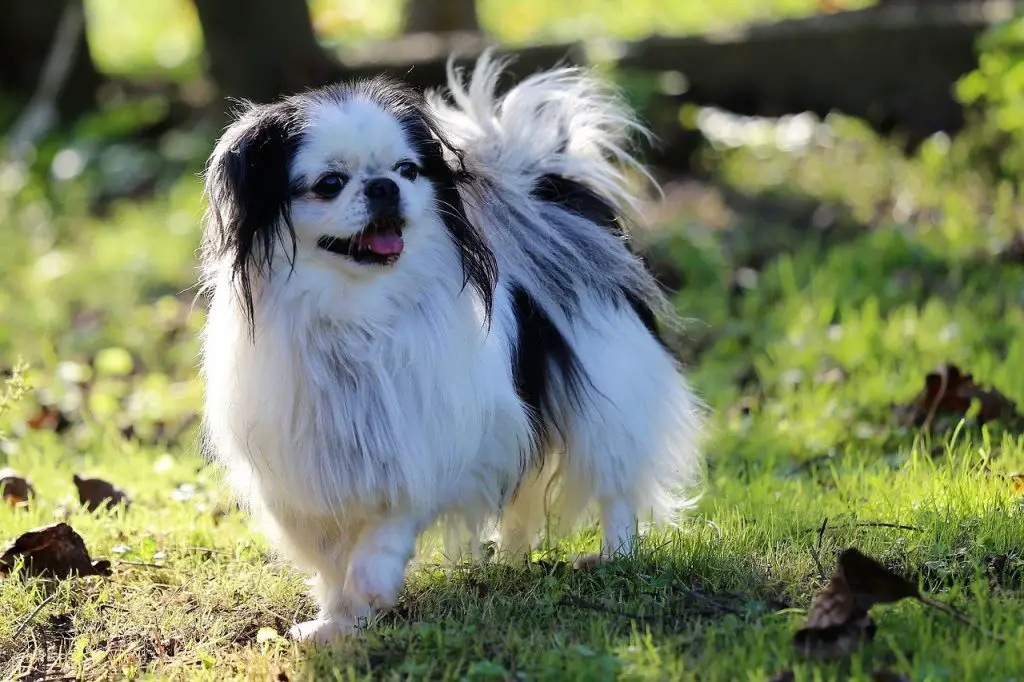
The Japanese Chin has a similarity to Chihuahuas and were bred to be companions. They have a distinct and regal look, thanks to their flowy hair.
This breed adapts well to apartment living and suitable for first-time owners. When it comes to mingling with chickens outdoors, Japanese Chins can be trained to leave the livestock alone. They aren’t very energetic and their prey drive is at a lower range.
Moreover, the Japanese Chin isn’t very energetic and they don’t require too much exercise. They’re not wanderers either so they will be happy to look after your chickens.
Despite being chicken-friendly, you shouldn’t let Japanese Chins stay outdoors for long. As a flat-faced canine, this breed is prone to overheating, especially during summer. Also, they require companionship or they will develop separation anxiety.
3. Old English Sheepdog
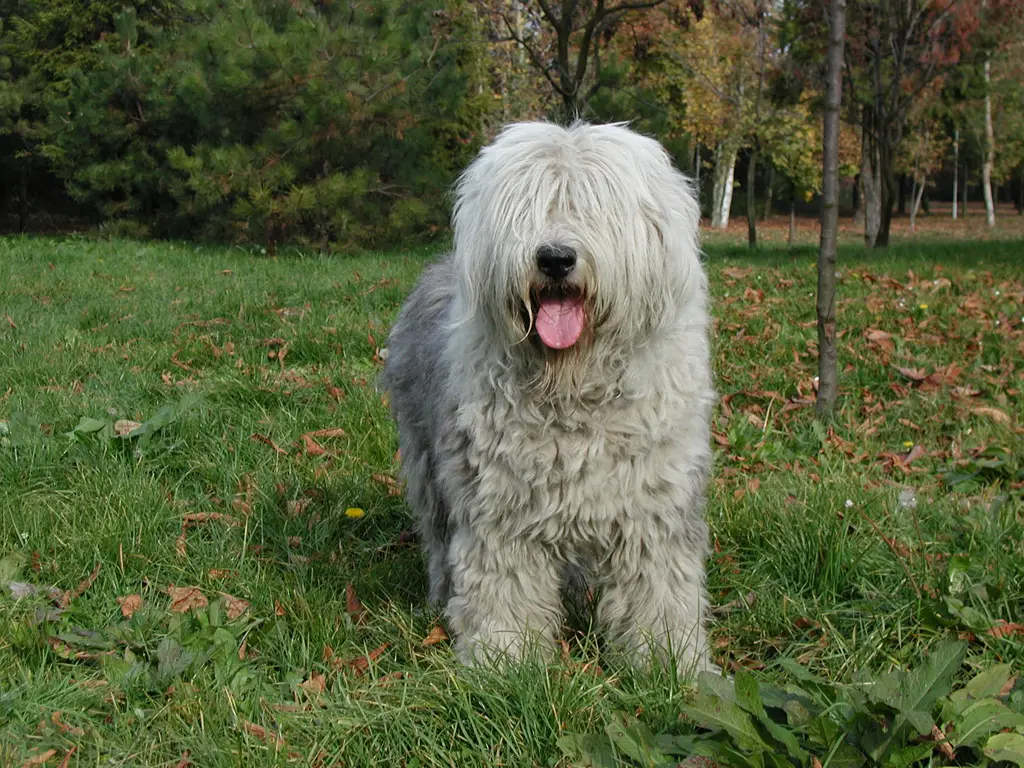
The Old English Sheepdog is easy to spot – it has a very shaggy coat to the point that it already covers their faces. OES are purebred dogs, but it’s easy to find them, especially in shelters and rescue centers.
This breed is nothing but friendly and affectionate. They love being with their people and can be raised with other animals. Early desensitization and training will make an Old English Sheepdog safe for chickens.
Moreover, this doggo is pretty athletic and will require a lot of exercise per day. Also, this pooch drools a lot, which can make their shaggy fur really dirty.
In terms of prey drive, the Old English Sheepdog has a manageable level. Just make sure that you keep this dog busy or with a companion to prevent the occurrence of separation anxiety.
4. Great Pyrenees
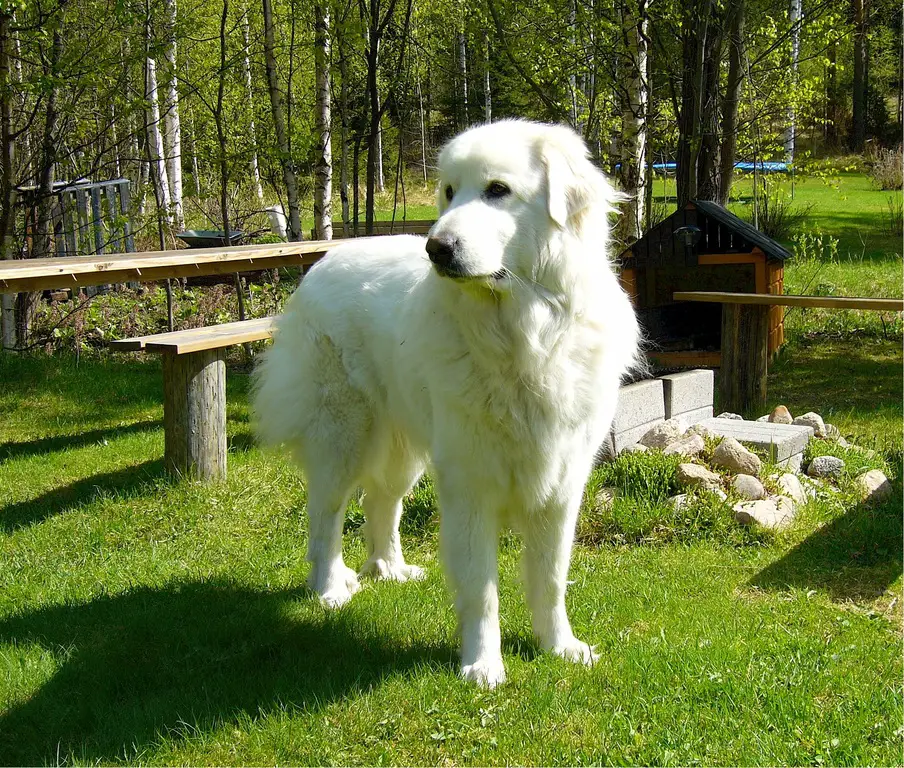
At first glance, it’s easy to think that the Great Pyrenees is a faded Golden Retriever. But far from the retriever look-alike, Great Pyrenees are working dogs bred to protect livestock and their owners.
Despite their large size, Great Pyrenees dogs are very affectionate and friendly. They are easy to train to protect chickens and not attack them.
However, this doggo is a massive shedder so grooming them isn’t easy. They also love taking solo strolls around the neighborhood, so make sure that you keep them in a fenced yard. You also have to train them well so their prey drive will be directed to intruders and not your livestock.
Aside from that, the Great Pyrenees need ample exercise to stay happy. You should take them on long walks to drain their energy.
5. Maremma Sheepdog
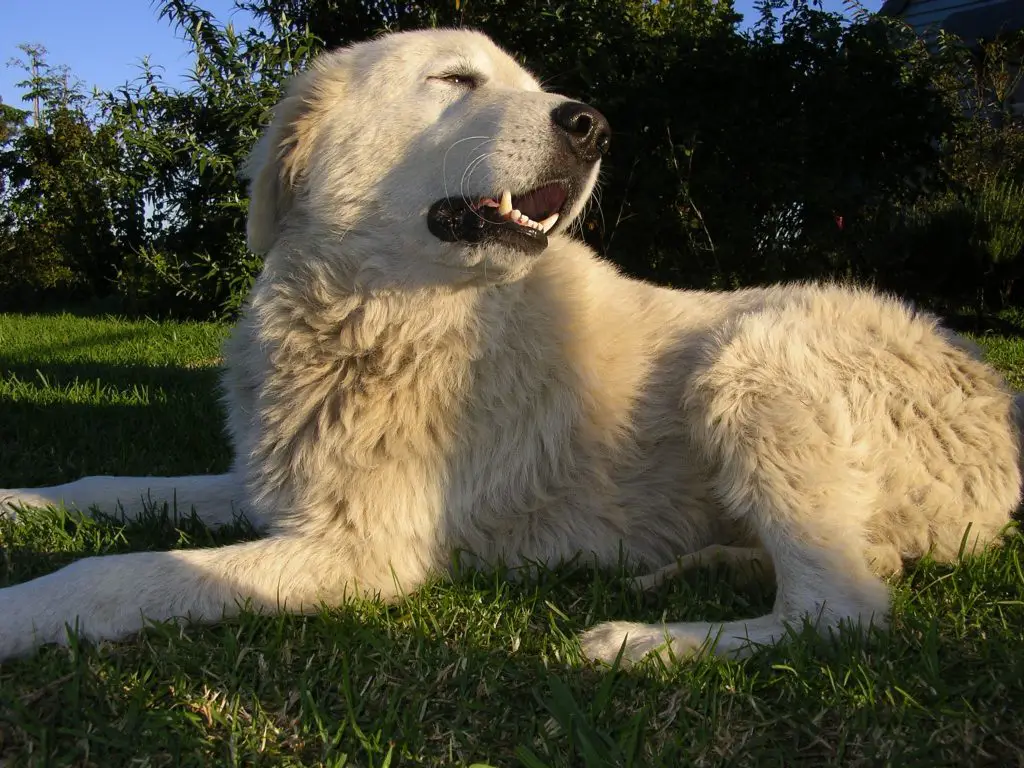
The Maremma Sheepdog is a breed from Central Italy. They are quite rare in the U.S. so that means it would be expensive to get one.
This doggo was bred to guard flocks against predators like bears and wolves. With this, it would be easy to train the pooch to protect and not attack chickens. Overall, the Maremma Sheepdog can get along with almost anyone and any animal.
The Maremma Sheepdog breed is very intelligent but they shed quite a lot. Intense grooming is needed for this breed, but it’s just a small sacrifice since this doggo has an excellent personality.
Just take note that Maremma Sheepdogs can be pretty strong-willed so patience is necessary during training. Also, they love barking, which is something you have to work on.
6. Akbash
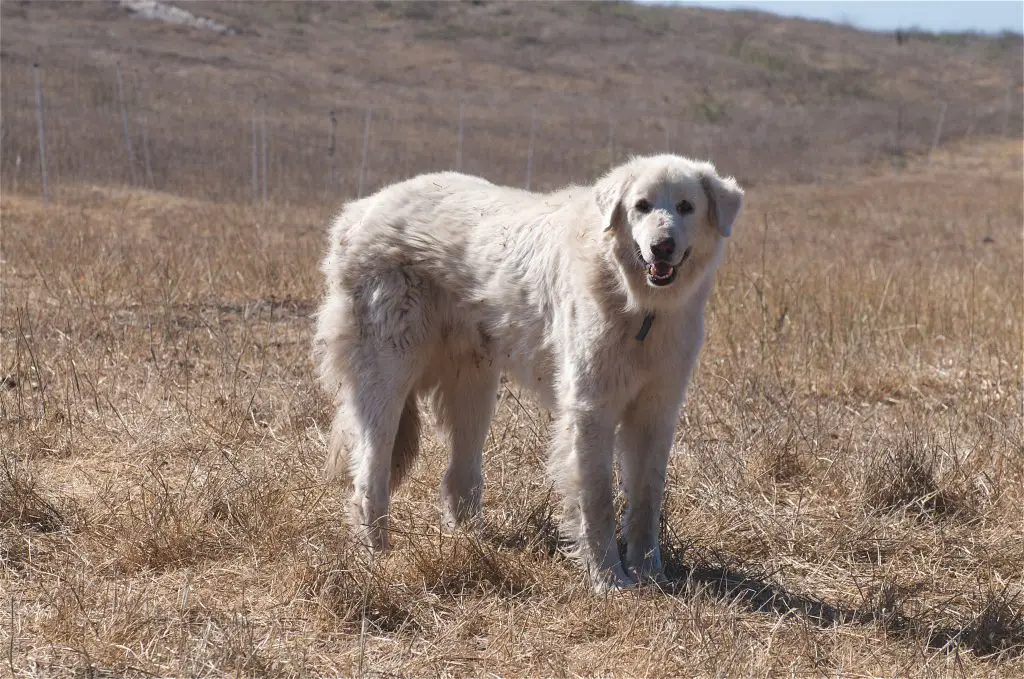
Like the Anatolian Shepherd, Akbash also came from Turkey. They are alert and obedient canines with very low prey drive. While they aren’t very easy to train, a little patience will go a long way for this pooch.
Moreover, the Akbash dog is very affectionate to their masters. They also get along with kids, but they may become standoffish with other dogs at first. This doggo is also aloof of strangers and will tend to guard the people and animals they consider family.
In terms of energy level, Akbash dogs aren’t very demanding. They are gentle dogs that are happy with short walks and indoor playtime. Above all, this dog is independent and can tolerate being left alone at home.
7. Kuvasz
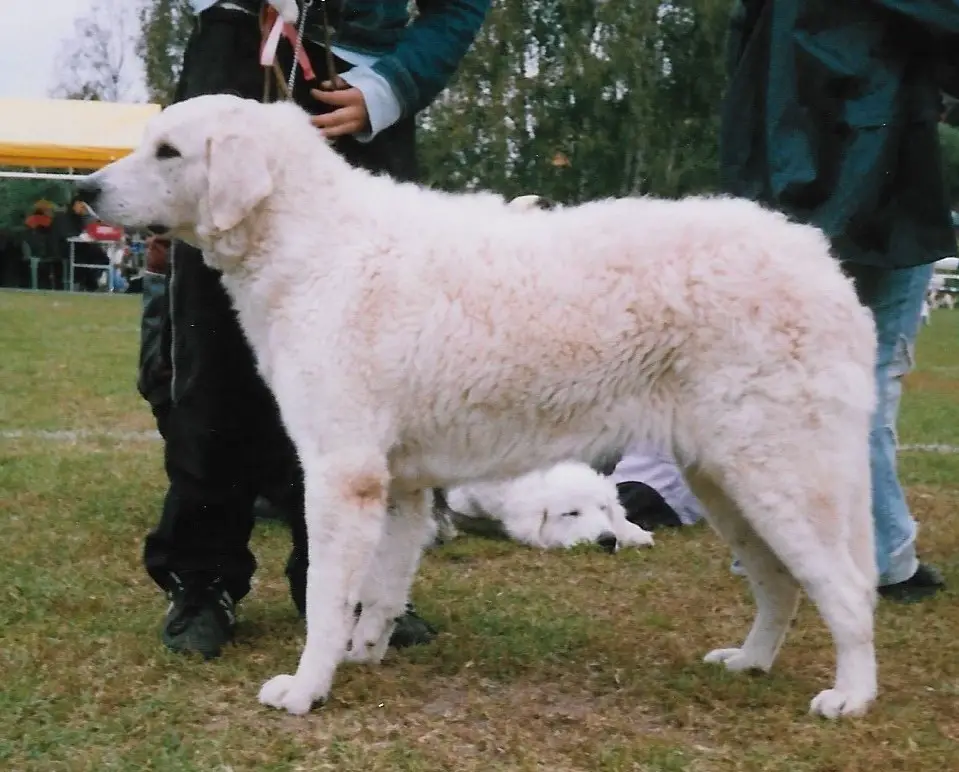
Bred to be a flock-guarding canine, the Kuvasz dog is guaranteed to be good to your chickens. This large doggo hails from Hungary and is a natural protector. They are affectionate to their masters, but they aren’t the best picks for those with young kids and other dogs.
Moreover, the Kuvasz dog has a very low prey drive. They are intelligent but can be difficult to train because of their strong-willed personality. But with consistency, this doggo will yield to your commands.
Before you get this dog, it’s important to know that this is a ball of energy. Kuvasz dogs require a lot of exercises outdoors to stay happy and healthy.
If you raise them well, Kuvasz dogs will be loyal and dedicated guard dogs. You can count on them to defend your chickens.
8. Bichon Frise
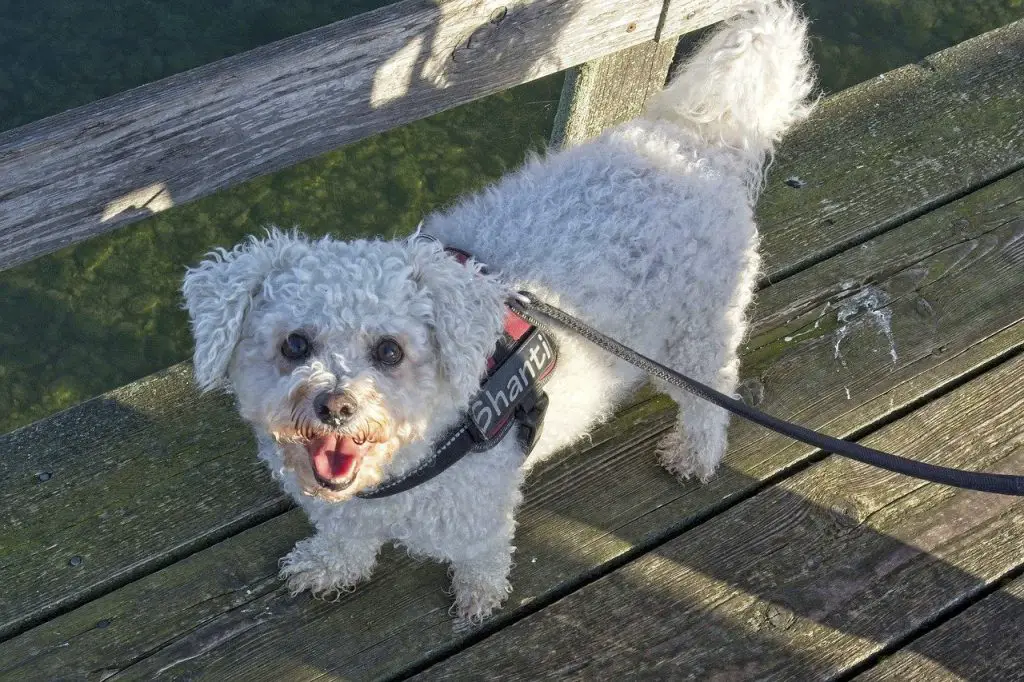
The last breed on this list is the cheerful Bichon Frise. Although not guard dogs by nature, they are easy to train not to bother the chickens in the yard.
Aside from that, Bichon Frises are very affectionate and kid-friendly. They don’t mind being with other dogs so it’s easy for them to get along with almost anyone.
Bichon Frise is also an excellent breed for first-time dog owners. However, they are quite sensitive and can’t tolerate being left alone for long hours. And due to its size and coat, this dog is best raised indoors.
If there’s one consolation here, it’s the fact that Bichon Frises don’t shed or drool a lot. Still, proper grooming is needed to keep their coat healthy.
Frequently Asked Questions
Q: Can dogs and chickens live together?
A: Yes, but intense and proper training is needed to curb any potential aggression on the canine. Also, you should choose the right breed that’s less likely to pose harm to your livestock. Pair that with supervision and your dog will not dare kill your chickens.
Q: Will dogs attack chickens?
A: To be safe, we can assume that all dogs will attack chickens without training. However, some breeds are less likely to be aggressive toward livestock. It’s important to train the pooch and assess its specific temperament and personality before letting them mingle with the chickens.
Q: How do you train a dog to leave chickens alone?
A: Basic commands like ‘sit’, ‘stay’, and ‘leave it’ are a good start to teach your dog to leave the chickens alone. Positive reinforcement through rewards will also go a long way here. If the dog looks too interested in the chicken, disrupt the behavior by calling its name. When the dog comes, reward it with a delicious treat.
Q: How do you introduce a dog to chickens?
A: It’s important to take this process slowly so your dog won’t become aggressive toward the chickens. Start by putting your dog on a leash and holding a chick in your hand. Command the dog to sit and carry the chick a bit close to the dog. Make sure that you’re ready to step back in case the pooch tries to bite or bark. Let the pooch sniff and become familiar with the chick. Keep these sessions
Q: How do I train my dog not to hurt chickens?
A: Desensitization is the key if you want your dog to stop chasing and biting your chickens. You should also start acquainting your dog to chickens during its early life. Also, reward the dog every time it will stop bothering the chickens. It’s important to know that some dogs just can’t be trained out of chasing after prey. That’s why it’s important to choose the right breed.
Final words
The dog breeds that get along with chickens should have a manageable prey drive and easy-to-train nature. While there are some breeds that don’t usually attack chickens, you should still train and desensitize the pooch properly. This way, you can guarantee that there would be no slaughter to take place in your yard.
Does your dog get along with chickens very well? How did you train the pooch? Share your experience with us!
